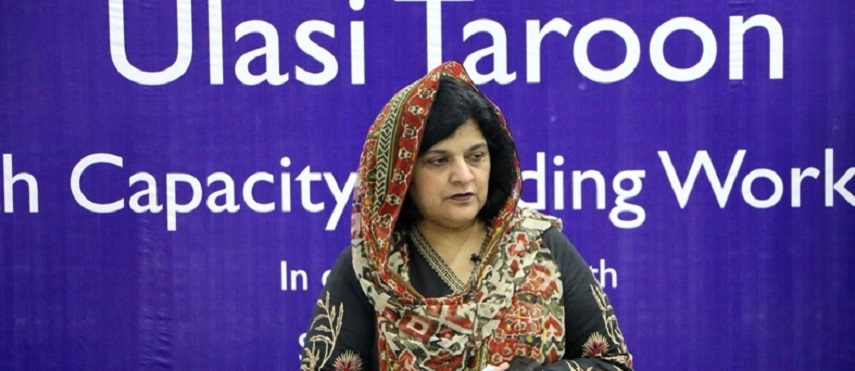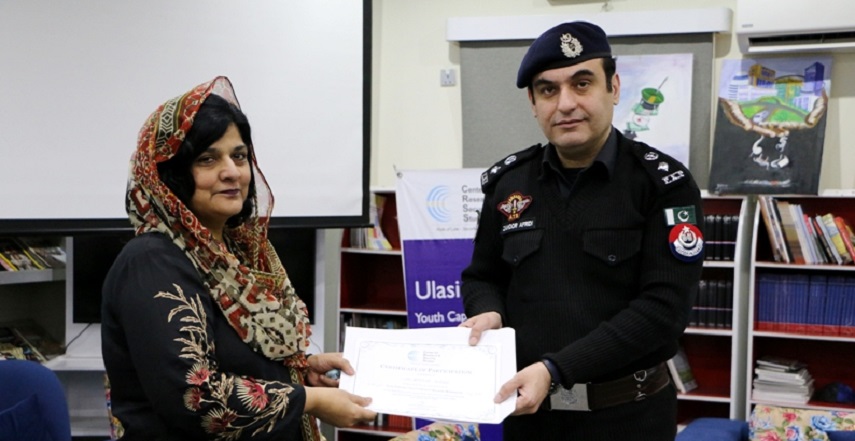Responsible citizenship demands respect for the constitution and all those laws promulgated by the legislature – both at the provincial and federal level. Pakistan’s youth – over 60% of which is below 30 years of age – must be aware of the laws and their rights and responsibilities enshrined in the constitution. Only by knowledge of these laws, can these future leaders effectively participate in the decision making processes and contribute to matters related to democracy and governance. The youth must believe in the importance of small determined steps crucial to create a prosperous and connected future. They should focus on gaining education key to social cohesion and strive for responsible citizenship, clarity of thoughts, peaceful coexistence and discourage intolerance and other social evils and menaces.
These views were expressed by Mr. Zahoor Afridi, Senior Superintendent of Police (SSP) Operations, Khyber Pakhtunkhwa Police, Peshawar, during the 26th round of Ulasi Taroon Youth Capacity Building Workshops, organized by the Center for Research and Security Studies (CRSS) at and in collaboration with Shaheed Benazir Bhutto Women University, Peshawar.
Mr. Zahoor Afridi underscored that youth can play a key role of in upholding rule of law, especially in the wake of these innumerable challenges facing the country in the contemporary times. The real capital of any country is the educated youth having the potential to strengthen social cohesion. National socio-political development demands equipping youth with the critical soft skills like critical thinking for complex problem solving. Youth must learn about and understand the challenges of the country. This also involves political awareness and participation. Any social change drive needs social change will.
Tolerance is a skill worth cultivating. The bravest person is the one who’s most tolerant. The youth – in universities and outside – must report any illegal activity to the law enforcement fraternity to play their role in crime control and peacebuilding. Their identities will be kept anonymous as per the police laws. Youth volunteerism will give them an unprecedented ownership of their communal problems. Success often comes to those who dare to act.
Dr. Aamir Raza, Professor, Department of Political Science, University of Peshawar said that social cohesion can only exist in an inclusive democracy where the citizens feel and believe that they are all equal and belong to the society, and an integral part of decision making process. Citizens in democracies have the responsibility and power to hold public representatives accountable. This improves the service delivery in a more effective manner and make it oriented for public welfare. Exclusion and unequal distribution of resources only leads to disintegration and jeopardizes the cohesion of the society.
Voting is just one aspect of democracy; it’s a process, not the spirit of democracy. Democracy means policy making that is inclusive of the issues that concern the citizens the most. In inclusive democracy, a wider number of people are part of the decision making process regardless of in majority or minority. Citizens role in democracy is not merely about criticizing the government but also exercise their due responsibilities. The service delivery systems are most efficient where the public consistently mobilize pressure on their representatives to fulfil their mandate. Social cohesion means choosing to be part of one whole despite social, political or cultural differences.
Ms. Shagufta Khalique, educationist, said that the universal declaration of human rights completely resonates with our core constitutional values about fundamental rights available to the citizens. Responsible citizenry demands paying respect to fundamental human rights, both in reality and as an essentiality. Pakistan has rich religious, cultural and ethnic diversity and respecting this diversity is critical to peaceful coexistence of the people from these diverse backgrounds. As a matter of social inclusion, every citizen is an important member of a society. So, we must respect people regardless of differences in terms of religion, culture, tradition, color, cast, political views etc. Learning about other faiths can help build interfaith harmony in the society. Inter-religious and intra-religious dialogue at the different forums can ameliorate the misunderstandings about other faiths. Such dialogues can use faiths as connectors in the diverse societies and build better understanding of and address misperceptions about others’ religions.
She said that prerequisites for sustainable conflict resolution are the skills of communication, listening and empathy with refined analytical skill. Youth as future leaders must equip themselves with these skills to be effective peace builders.
Mr. Malik Mustafa, Manager Programs, CRSS said that critical thinking – albeit – is a problem-solving skill but in its true application, it is much more than that. It’s not merely a criticism but a prism and a perspective to look at any situation, where you have a clear vision – critical to inform your decision – of all the potential aspects of that issue. Critical thinking is about developing your understanding and opinion on the basis of all the available information and using research based evidence to support your arguments and ideas.
Youth must comply with the core constitutional values of respect, equality, tolerance and rule of law to foster social cohesion in the society.
Ulasi Taroon is a counter radicalization initiative of CRSS that aims to address the radicalization challenges, extremist ideologies and foster social cohesion through a discourse anchored in the core constitutional values which are fundamentally essential prerequisites for social peace and harmony. The endeavor aims to cultivate and sensitize the youth – in the universities across KP – in the core values in the Pakistani constitution and our social contract. It’s an attempt to highlight the criticality of abiding by these ideals – such as adherence to rule of law, primacy and sanctity of constitution, equal citizenry, responsible citizenship, respect for fundamental human rights, tolerance for diversity and different opinions, inclusive democracy and good governance – as a measure of fostering social cohesion and peaceful co-existence.







